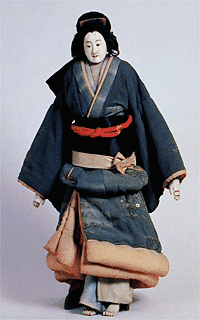From the "What could make Sudiegirl start to enjoy opera again?" files...
Anthony Minghella's Metropolitan Opera directorial debut (yep, all those words mean the Oscar winner is directing divas/divos/divettes) is tonight. It sounds like the experience (both visual and sonic) will be incredible.
If you've read my blog in the past, you'll know that I tried to study vocal performance (i.e. opera performance) at U of Iowa. I quickly realized that I didn't have it in me to make opera my life's work.
I learned that opera singing is a way of life, not unlike professional athletics. Even though you can sing until the day you die, the voice does become less limber as time passes. It's a life that was hard for me to embrace, so I didn't. I really don't regret it, for many others deserve that kind of life because they've been working at it much longer than I did.
What surprises me about the Met's decision to have Minghella direct "Madame Butterfly". The music itself is a favorite of many opera buffs. "Un Bel Di" is a challenge for any lyric soprano. The storyline was controversial in the day, and really, it still is. The opera is about a Japanese woman's love for an American soldier, and she becomes pregnant out of wedlock, is abandoned, and has the child...I'm not going to ruin the ending. (I think I'm right...it's been a long time since I've listened to it...let me know if I am incorrect.)
Minghella is an Academy-Award winning director for "The English Patient" and also directed many of the "Storyteller" episodes from HBO and Jim Henson Productions. (I'm sure Ed H. is reading this...if he is, I do implore him to correct my errors in the comments as I'm not as learned in film as he is.) He's also a gifted screenwriter.
I guess I'm just used to associating Franco Zeffirelli's brand of pageantry on stage. I'm not knocking it, but "Madame Butterfly" is the type of opera that really can lend itself to imaginative staging. I think that Minghella's ideas are definitely in that line of thinking.
According to the article, the Metropolitan Opera is trying to change the public's views of opera...according to current surveys, the average age of the opera audience is increasing by one year every year. Currently, the average age is 65 years old.
So, Sudiegirl...you're babbling about opera - how is THIS production going to be so breathtakingly, stupendously new? Well, here are some examples (noted from the article in bold font):
1. When the lights darken, after music director James Levine leads the annual opening-night rendition of "The Star-Spangled Banner," the customers who have paid up to $5,000 each for the gala performance and supper will see a dark stage with no set, with a solitary geisha silhouetted by bright red light, an opening created by Minghella, choreographer Carolyn Choa (his wife), set designer Michael Levine and lighting designer Peter Mumford.
2. When Minghella arrived at the Met, he had the cast rehearse Puccini's tearjerker without any music. The Academy Award-winning director of "The English Patient" told them to think before they acted, spoke to them quietly and convincingly.
He (editor's note: Minghella) forced singers who have performed these roles many times in many places to strip away actions that had become routine.
"He is working like he is in front of the camera, so he wants everything we do like a close-up," said Marcello Giordani, his Benjamin Franklin Pinkerton. "I was used to always from other directors running back and forth on stage, `Do some expression with your face ...' But he taught me: I learned that less is good."
3. His most controversial decision was to use a Japanese Bunraku puppet to represent Cio-Cio-San's toddler son. (click here to read about what a Bunraku puppet is...and here's an example of what one looks like. 
Basically, the puppeteers are on the stage with the puppet, in full view.)
4. To create a buzz, Gelb arranged for opening night to be simulcast on screens at Lincoln Center Plaza and Times Square. It's part of a media plan that will have up to four operas per week on Sirius Satellite Radio and six per season televised in high definition to movie theaters in North America and Europe, performances that will be televised later on PBS.
The article explains all these ideas in context as well as several more, so please take the time to read it.
The Washington Opera (under Placido Domingo's direction) is undergoing similar tranformations in terms of production design, direction, costuming, and general sensibilities. I'll find links to some of their projects and provide them here in the blog.
I'm sure hard-core opera lovers are thinking that this is desecration of a respected art form.
However, here's my opinion. I don't like all forms of music myself. However, I also recognize that you can do two things to music:
1. You can "lock it up" in a mental "display case" of sorts. It's kept pristine, immune to any change whatsoever so the experience will be JUST THE SAME as it was before you put it in the box.
2. You can work with it and keep its integrity while introducing new concepts to enhance the production and make it relevant. I liken it to being a "musical botanist", with the challenge of balancing natural integrity with new settings.
I'm really out of the loop as far as the opera world, but to be honest, this kind of stuff could bring me back in as a fan. Stay tuned...
Sudiegirl
(who was once an aspiring diva, but opera directors don't let you bring rubber chickens on stage to smack the tenor with.)
PS: More news and goofiness to follow.













 /div>
/div>






|